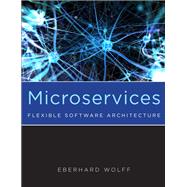The Most Complete, Practical, and Actionable Guide to Microservices
Going beyond mere theory and marketing hype, Eberhard Wolff presents all the knowledge you need to capture the full benefits of this emerging paradigm. He illuminates microservice concepts, architectures, and scenarios from a technology-neutral standpoint, and demonstrates how to implement them with today’s leading technologies such as Docker, Java, Spring Boot, the Netflix stack, and Spring Cloud.
The author fully explains the benefits and tradeoffs associated with microservices, and guides you through the entire project lifecycle: development, testing, deployment, operations, and more. You’ll find best practices for architecting microservice-based systems, individual microservices, and nanoservices, each illuminated with pragmatic examples. The author supplements opinions based on his experience with concise essays from other experts, enriching your understanding and illuminating areas where experts disagree. Readers are challenged to
experiment on their own the concepts explained in the book to gain hands-on experience.
- Discover what microservices are, and how they differ from other forms of
- modularization
- Modernize legacy applications and efficiently build new systems
- Drive more value from continuous delivery with microservices
- Learn how microservices differ from SOA
- Optimize the microservices project lifecycle
- Plan, visualize, manage, and evolve architecture
- Integrate and communicate among microservices
- Apply advanced architectural techniques, including CQRS and Event Sourcing
- Maximize resilience and stability
- Operate and monitor microservices in production
- Build a full implementation with Docker, Java, Spring Boot, the Netflix stack, and Spring Cloud
- Explore nanoservices with Amazon Lambda, OSGi, Java EE, Vert.x, Erlang, and Seneca
- Understand microservices’ impact on teams, technical leaders, product owners, and stakeholders
Managers will discover better ways to support microservices, and learn how adopting the method affects the entire organization. Developers will master the technical skills and concepts they need to be effective. Architects will gain a deep understanding of key issues in creating or migrating toward microservices, and exactly what it will take to transform their plans into reality.








